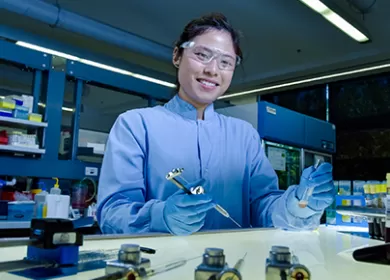Why plasma matters
Picture this:
Your young daughter comes home from school and complains of stomach cramps and diarrhoea. You chalk it up to a bad food experience and let her sleep it off.
The next day she's feeling fine again — but the symptoms keep coming back over the coming weeks. She looks weak. She’s not eating well. You take her to the doctor, and after several rounds of blood tests you find out that what seemed like simple stomach cramps is actually caused by an immune disorder. It was inherited genetically, and there’s no cure.
Sadly, this scenario is not hypothetical, and for Marleigh Fisher’s parents, it’s a distressing reality. Marleigh was diagnosed with a disorder called autoimmune encephalitis when she was just 3 years old, where her immune system doesn’t recognise her normal brain cells as healthy. Her body triggers an immune response that attacks her brain cells, giving her seizures.
Approximately 5% of the population have an autoimmune disease.
In the past, there would have been nothing to do for poor Marleigh and many other Australians like her. There are more than 100 different forms of primary immune disorders (PIDs), and while rare, they are severely life-altering.
You’re the solution
Fortunately, doctors and medical researchers have developed treatments that help ensure people like Marleigh can live a normal and happy life. These include intravenous immunoglobulin infusions or IVIg.
IVIG is a “fractionated blood product”, made from the combined plasma of many generous donors. Fractionated products are made when proteins from donated blood products are identified, purified, and concentrated into medicinal doses.
One of these products is Immunoglobulin G (IgG) antibodies which help stop the body from attacking itself, reducing inflammation, seizures, fever, abdominal issues, and many other symptoms that people with PIDs experience. First developed in the 50s, the product is now widely used across Australia to treat various autoimmune diseases.
What is plasma?
Our blood isn’t just red! Did you know that more than 50% of our blood is made up of liquid called plasma? Plasma is full of many things, including proteins and vitamins that are essential for our bodies to operate healthily. While most of us are fortunate enough to have a healthy immunity, there are people like Marleigh whose only chance at survival is through IVIg infusion from healthy donors. Giving plasma gives you the opportunity to help people with PID have a shot at a healthy life.
Plasma can be a real game changer!
18 life-giving ways
That’s right — plasma can be used in a massive 18 different ways to help change lives.
The list of ways plasma can change lives is long! In addition to helping treat people like Marleigh with a compromised immune system, it can help protect people with diseases like measles and chickenpox, treat liver disease, help with severe burns and more!
Learn more about the 18 ways plasma helps.
Donating Plasma can be as simple as ABC
A - almost anyone can donate plasma every 2 weeks,
B - book yourself in online, via the app, or by calling up
C - components of blood, like your red blood cells and platelets, are returned to your body with a bit of saline during your plasma donation. It’s safe and easy.
1 in 3 people will need blood or blood products at some point in their life, and every time you donate, you’re making a difference to someone in need.
Donating plasma is a lot like giving blood, it just takes a little longer. Allow about an hour and a half for the whole appointing, but for most of this time, you’ll be sitting comfortably in a reclined chair with a blanket, having refreshments brought to you on request.
So, what are you waiting for? Get out there and donate today!
